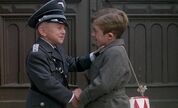Schlondorff's mise-en-scene skills and shot design are excellent. After the scene in which Alfred was fishing for eels with a horse's head at the seaside, the three people who had a chaotic relationship fell into a deadlock. Alfred, a German, used his arrogant control to force his mother to eat the eel he caught. As a poetic romantic, the mother could not accept the disgusting fact, and declared her anger by playing the piano crazy. Looking at his mother worriedly, Oscar beat the tin drum angrily in such a cruel reality, and Alfred just complained about Oscar's loud noises, he was just a representative of cowardice and insensitivity. Finally, the mother burst into the bedroom and cried, Bronski followed, and the two immediately had a relationship in the bedroom. Schlondorf designed a long shot to show the changes in the characters' emotions, and the spatial changes from the dining room to the bedroom were not interrupted. Narrative, we have said that the long shot is authentic and documentary, and in this scene, it is even more dramatic. The composition is cramped, using the rule of thirds, dividing the frame into three parts, one third of the people in the mirror, and two thirds of the men and women caught in the bed, creating a double performance space of the mirror and the bed, this kind of repression. The composition of the painting also shows the audience the psychological state of the characters in the double space: Alfred's cowardly reaction after being green, Bronski's inner entanglement, and the mother's difficult choice between the Poles and the Germans. The director used a beautiful transition here, focusing on the silhouette of Oscar hidden in the cabinet. Oscar silently listened to the cruel reality outside, how ugly the world of adults is, and Oscar does not want to grow up.
After a long time, the mother who came out of the house began to accept the eel. The mother expressed her resistance with a kind of extreme obedience. This reaction formation is a defense mechanism in psychology. Alfred himself is actually a metaphor. He used his nationality to metaphorize the oppression of humanity by the Nazis during the war. He wanted the people to become their spiritual appendages, and thus derived absolute control. In fact, the entire film is a metaphor, anti-Nazi oppression, satirizing the ugly and debauchery of adult society, so there is such an important object detail as a tin drum. When Oscar faces oppression and ruthless deprivation, he vents his emotions with drumming and screaming, alluding to Nazi shouting, reimagining himself from the ugly scene he saw under the poker table on his third birthday. In the future, he decided to stop growing up.
View more about The Tin Drum reviews











